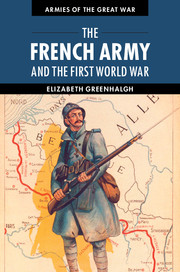Book contents
- Frontmatter
- Contents
- List of figures
- List of maps
- List of tables
- Preface
- List of abbreviations
- Introduction
- 1 The pre-war Army
- 2 1914: From the frontiers to Flanders
- 3 1915: On the offensive
- 4 1916: Verdun and the Somme
- 5 General Nivelle and his 1917 offensive
- 6 Restoring the Army
- 7 1918: German offensives
- 8 The path to victory
- 9 Armistices and demobilisation
- 10 From 1914 to 1919: Aux armes, citoyens!
- Notes
- Bibliographic essay
- Index
Introduction
Published online by Cambridge University Press: 05 November 2014
- Frontmatter
- Contents
- List of figures
- List of maps
- List of tables
- Preface
- List of abbreviations
- Introduction
- 1 The pre-war Army
- 2 1914: From the frontiers to Flanders
- 3 1915: On the offensive
- 4 1916: Verdun and the Somme
- 5 General Nivelle and his 1917 offensive
- 6 Restoring the Army
- 7 1918: German offensives
- 8 The path to victory
- 9 Armistices and demobilisation
- 10 From 1914 to 1919: Aux armes, citoyens!
- Notes
- Bibliographic essay
- Index
Summary
On the evening of 24 July 1914, the French war minister, Colonel Adolphe Messimy, summoned the commander-in-chief designate of the French Army, General Joseph Joffre. Messimy told him that, following the assassination in Sarajevo, Germany supported Austria-Hungary’s firm stance against Serbia in the matter. That support would represent direct opposition to Russia’s support for Serbia; hence France’s military agreements with Russia might come into play. Joffre recorded in his memoirs that he replied to Messimy: ‘Well, monsieur le ministre, if we have to make war we will do so.’ It must be presumed, therefore, that Joffre believed that France could emerge victorious. This book examines the French Army, which Joffre was to use to defeat Germany, in order to evaluate how well it performed. It begins with the reforms following the disastrous Franco-Prussian war, when France was defeated and humiliated, examines the battles between 1914 and 1918, and explains how France did indeed emerge victorious to sit at the victors’ table in 1919 for the signatures on the Treaty of Versailles.
The prelude to the First World War took place in North Africa. In 1911, at the height of the second Moroccan crisis, when the German gunboat Panther anchored off Agadir in order to protect the rights of German merchants in the North African country where French economic interests were growing, Europe feared a general war. France’s then premier, Joseph Caillaux, asked Joffre what France’s chances of victory were if such a war resulted from the crisis. He reminded Joffre that Napoleon Bonaparte had stated that a general should have at least a 70 per cent chance of victory before embarking on a battle, and Joffre replied that France did not possess such a margin. Caillaux ended the Moroccan crisis diplomatically, therefore, ceding a portion of the French Cameroons to Germany in return for German recognition of France’s protectorate in Morocco. War had been averted for three years.
- Type
- Chapter
- Information
- The French Army and the First World War , pp. 1 - 6Publisher: Cambridge University PressPrint publication year: 2014

